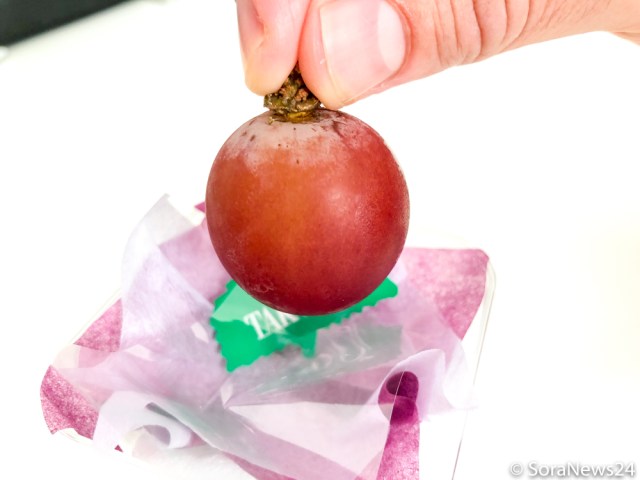
Japan is known for its crazily expensive fruit, but is the Ruby Roman really worth the exorbitant price tag?
In 2016, a bunch of about 30 grapes sold for 1.1 million yen (US$10,190) in Japan, and since then the same variety of grapes has been hitting record highs every year, with a bunch at this year’s first wholesale market auction selling for 1.2 million yen.
The variety is called Ruby Roman, a type of grape which was named by a public vote and made its first debut in 2008. Grown exclusively in Ishikawa Prefecture, Ruby Roman grapes are required to weigh at least 20 grams and have an 18-percent sugar content, leading them to be prized for their sweetness and low acidity.
Every grape is carefully inspected to guarantee its quality, with bunches being sold in high-end department stores and specialty shops like Takano, an esteemed Shinjuku-based fruit purveyor with a long-standing reputation that goes all the way back to 1885.
We stopped by Takano to take a look at their Ruby Romans, where we raised our eyes in surprise at the price tag.
▼ A bunch of Ruby Roman grapes retails for 43,200 yen (US$400.50).
Just as we began to lament the fact that we’d never be able to afford such a decadent purchase, we turned around to the display case and saw they had some more affordable options for those wanting to get a taste of the grape on a budget.
▼ Single grapes on sale for 1,080 yen (US$10.01).
We’d never usually pay $10 for a single grape, but after seeing a bunch on display for $400, we figured this was a bargain. We took our prized purchase back to the office, where we could take a closer look at its beauty.
The solitary fruit was beautifully presented in a single box, sitting upon a grape-coloured paper like a queen on a throne.
The grape came with a little note that said “Please eat as soon as possible”.
That wasn’t going to be difficult, as our taste buds had already begun salivating at the sight of the plump, oversized grape, which was roughly the size of a ping pong ball.
Popping it on a plate, we could see the fruit had been picked at peak ripeness, with the knobbly end of the stem still attached to keep it at its freshest.
Staff at the store had advised us to refrigerate the grape before eating to really experience its best flavour. They also told us that, like many Japanese grapes, the Ruby Roman needed to be peeled before being consumed, so that’s exactly what we did.
After carefully peeling away the thick skin, we could see that this was one heck of a juicy grape.
▼ The naked beauty then bared its golden, red-flecked flesh to us, its moist surface glistening in the light.
Wanting to see more, we took out a knife and sliced it through the centre. This is when we became really curious, as it kind of looked like a grape, but entirely different at the same time.
To really see how different it was, we sliced up a regular grape to compare. The common grape had a more oval shape, much firmer flesh, and a tighter centre.
The Ruby Roman, on the other hand, was much more plump and rounded, with paler colours and a moist centre that dripped with juice as we sliced into it.
So how did it taste? Well, in a word, extraordinary. It was far from being an everyday, ordinary grape, as the level of sweetness, and the thick, syrupy texture of the liquid that burst onto the tongue, was more akin to a lychee. Surprisingly, though, it had a lovely grape taste which was so juicy and flavourful that it was just like having a mouthful of grape juice. In fact, it was so juicy that it melted on the tongue in moments, disappearing with a refreshing aftertaste that left us longing for just one more.
We couldn’t afford one more, though, so our fleeting encounter with the $10 grape was over as soon as it had begun. It was a memorable experience that was definitely worth the price tag, and now we can add it right behind the $29 Japanese persimmon on our list of expensive fruit experiences.
Photos ©SoraNews24
● Want to hear about SoraNews24’s latest articles as soon as they’re published? Follow us on Facebook and Twitter!

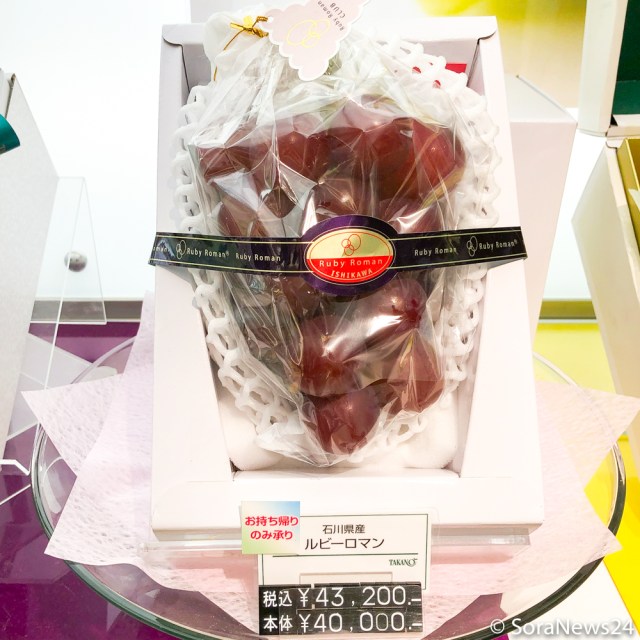
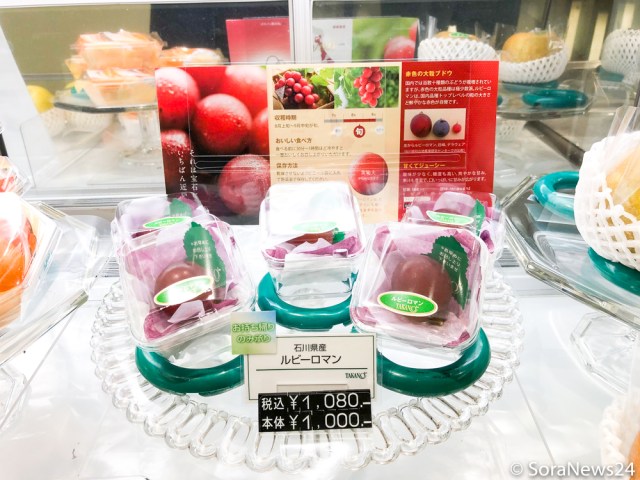
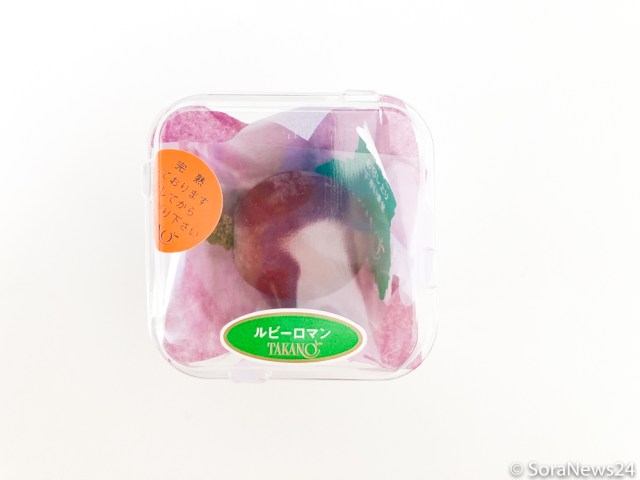
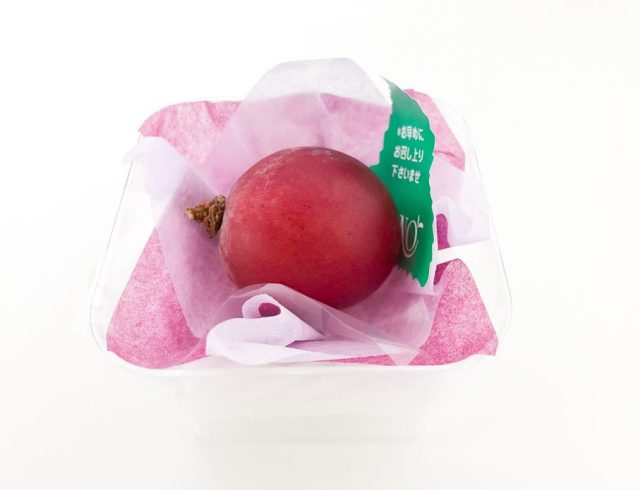

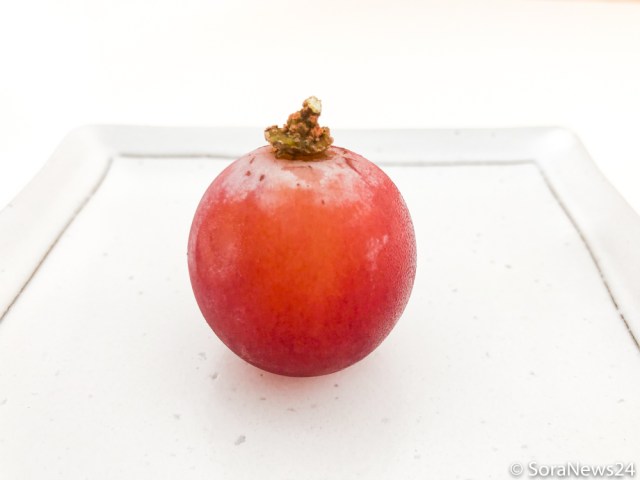
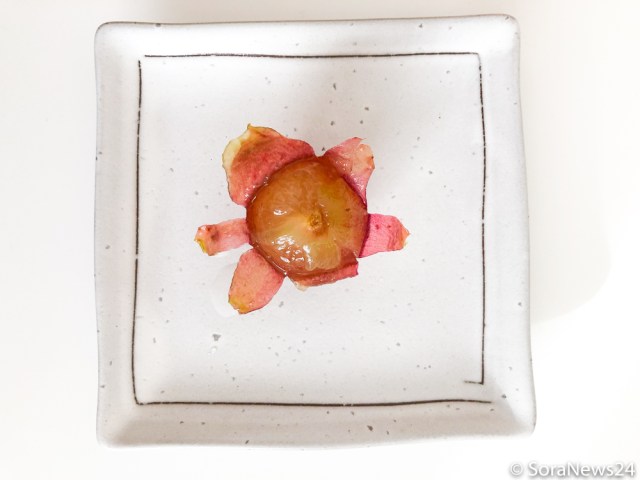
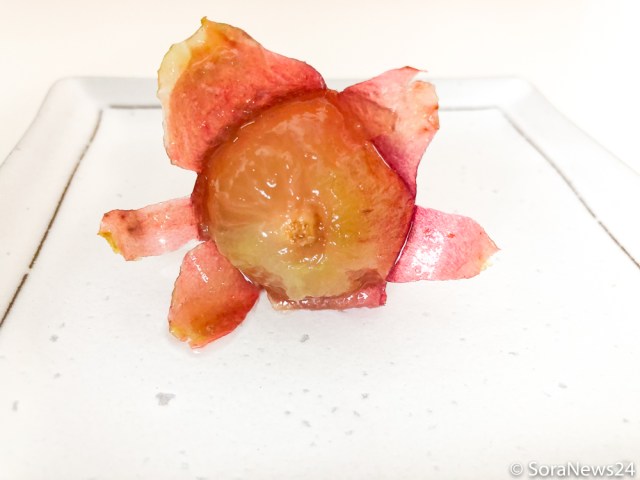
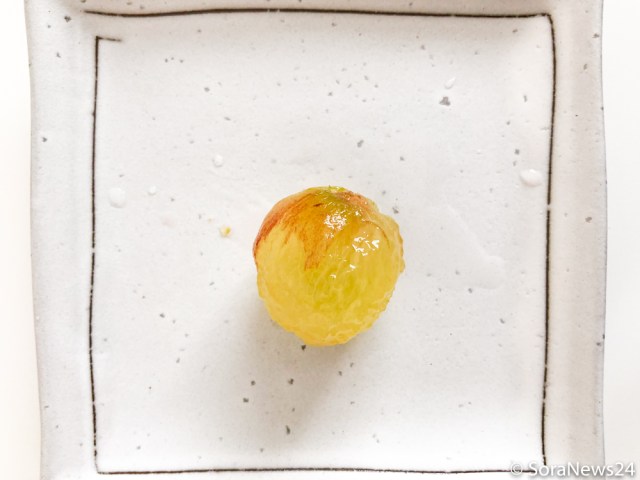
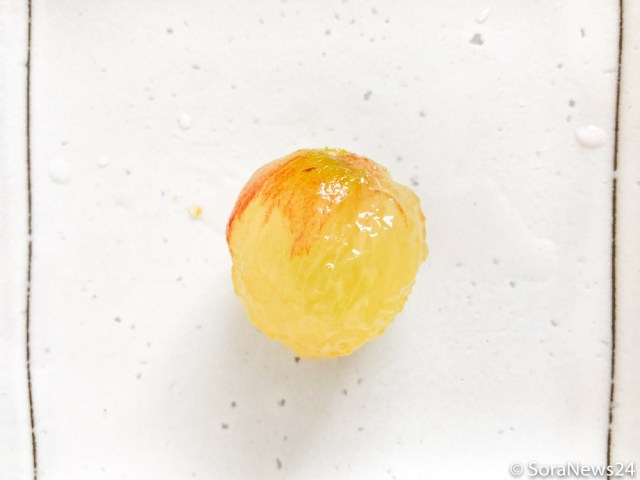
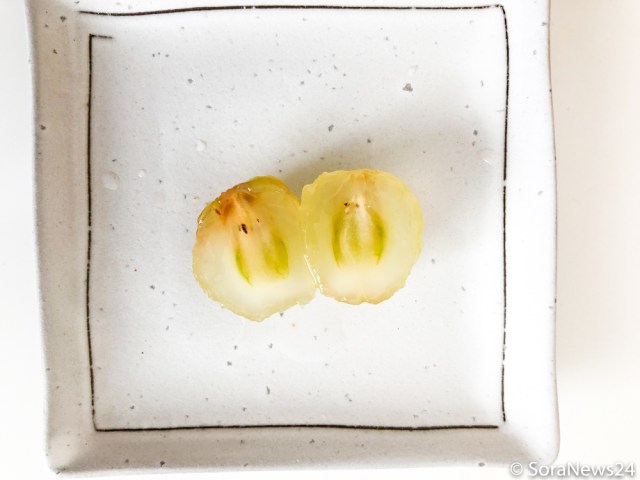
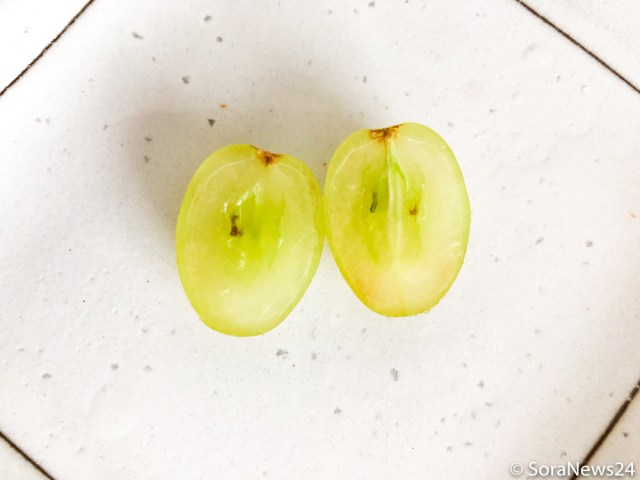
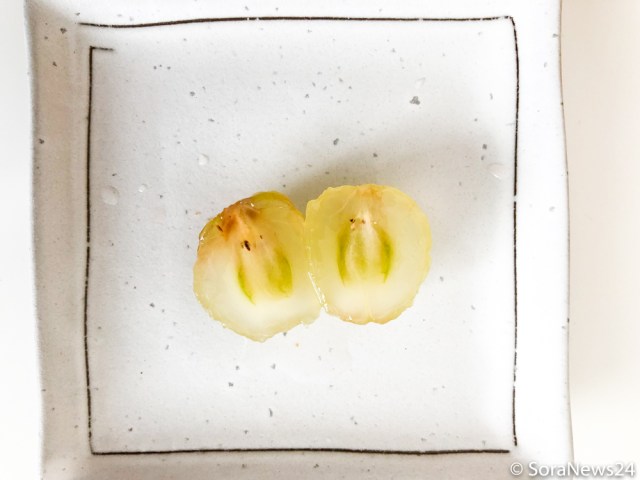
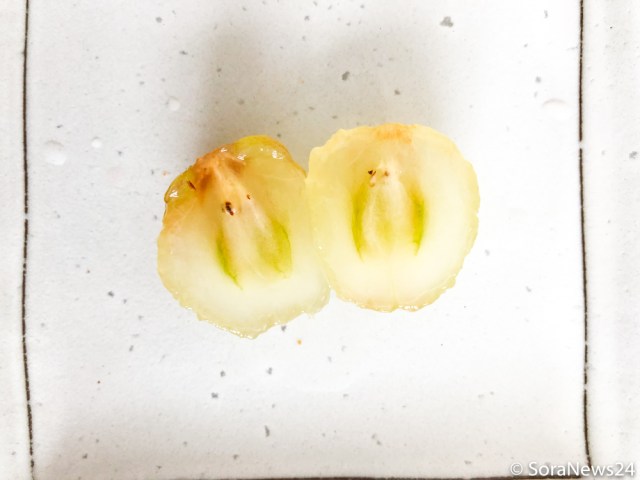
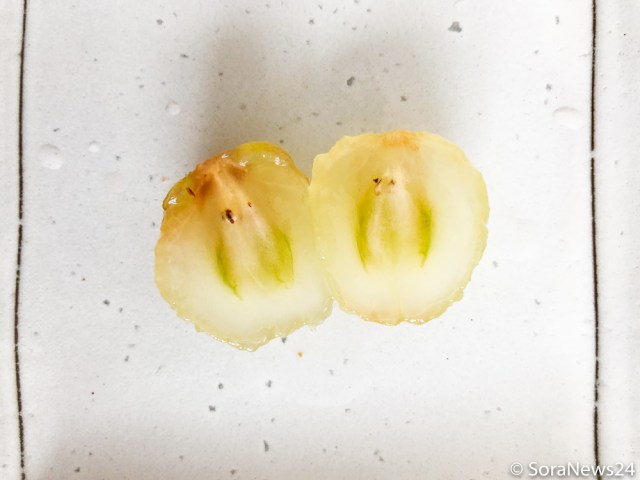
 Mr. Sato shows us what happens when you try to cook rice with only eggs 【SoraKitchen】
Mr. Sato shows us what happens when you try to cook rice with only eggs 【SoraKitchen】 Is a 60,000-yen (US$400) rice cooker worth the price? We rented one to find out
Is a 60,000-yen (US$400) rice cooker worth the price? We rented one to find out Ultimate lazy sukiyaki – Can you make the king of Japanese hot pots in a rice cooker?【Taste test】
Ultimate lazy sukiyaki – Can you make the king of Japanese hot pots in a rice cooker?【Taste test】 Can we pick out the expensive Japanese grapes in a blind taste test?
Can we pick out the expensive Japanese grapes in a blind taste test? Mr. Sato eats banana flower, still isn’t sure what it tastes like, loves it anyway【SoraKitchen】
Mr. Sato eats banana flower, still isn’t sure what it tastes like, loves it anyway【SoraKitchen】 Viral Japanese cheesecake from Osaka has a lesser known rival called Aunt Wanda
Viral Japanese cheesecake from Osaka has a lesser known rival called Aunt Wanda The best Hobonichi diaries, covers and stationery for 2026
The best Hobonichi diaries, covers and stationery for 2026 Lawson adds doughnuts to its convenience store sweets range, but are they good enough to go viral?
Lawson adds doughnuts to its convenience store sweets range, but are they good enough to go viral? Sento bathhouse gets a new lease on life as a Tokyo cafe and office space
Sento bathhouse gets a new lease on life as a Tokyo cafe and office space Drift ice in Japan is a disappearing winter miracle you need to see now
Drift ice in Japan is a disappearing winter miracle you need to see now Death Spray from Japan causes buzz online for powerful ability to cut ties with bad energy
Death Spray from Japan causes buzz online for powerful ability to cut ties with bad energy Fives places around Japan to appreciate the plum blossoms this season
Fives places around Japan to appreciate the plum blossoms this season Hoisu: The phantom Japanese sake that can’t be purchased in stores
Hoisu: The phantom Japanese sake that can’t be purchased in stores New Totoro insulated bags are for baby bottles (but secretly for grown-up fans too)【Photos】
New Totoro insulated bags are for baby bottles (but secretly for grown-up fans too)【Photos】 Picture of a pufferfish vomiting water is the Japanese Internet’s newest darling
Picture of a pufferfish vomiting water is the Japanese Internet’s newest darling Starbucks Japan releases first-ever Hinamatsuri Girls’ Day Frappuccino
Starbucks Japan releases first-ever Hinamatsuri Girls’ Day Frappuccino Japanese restaurant chain serves Dragon Ball donuts and Senzu Beans this spring
Japanese restaurant chain serves Dragon Ball donuts and Senzu Beans this spring Highest Starbucks in Japan set to open this spring in the Tokyo sky
Highest Starbucks in Japan set to open this spring in the Tokyo sky Japan Extreme Budget Travel! A trip from Tokyo to Izumo for just 30,000 yen [Part 1]
Japan Extreme Budget Travel! A trip from Tokyo to Izumo for just 30,000 yen [Part 1] Japan has only one airport named after a samurai, so let’s check out Kochi Ryoma【Photos】
Japan has only one airport named after a samurai, so let’s check out Kochi Ryoma【Photos】 Japan Extreme Budget Travel! A trip from Tokyo to Izumo for just 30,000 yen [Part 2]
Japan Extreme Budget Travel! A trip from Tokyo to Izumo for just 30,000 yen [Part 2] Japan’s craziest burger chain takes menchi katsu to new extreme levels
Japan’s craziest burger chain takes menchi katsu to new extreme levels Japanese drugstore sells onigiri at pre-stupid era prices, but how do they compare to 7-Eleven?
Japanese drugstore sells onigiri at pre-stupid era prices, but how do they compare to 7-Eleven? Yakuzen ramen restaurant in Tokyo is very different to a yakuza ramen restaurant
Yakuzen ramen restaurant in Tokyo is very different to a yakuza ramen restaurant Tokyo Skytree turns pink for the cherry blossom season
Tokyo Skytree turns pink for the cherry blossom season Japan’s newest Shinkansen has no seats…or passengers [Video]
Japan’s newest Shinkansen has no seats…or passengers [Video] Starbucks Japan releases new sakura goods and drinkware for cherry blossom season 2026
Starbucks Japan releases new sakura goods and drinkware for cherry blossom season 2026 Foreigners accounting for over 80 percent of off-course skiers needing rescue in Japan’s Hokkaido
Foreigners accounting for over 80 percent of off-course skiers needing rescue in Japan’s Hokkaido Super-salty pizza sends six kids to the hospital in Japan, linguistics blamed
Super-salty pizza sends six kids to the hospital in Japan, linguistics blamed Starbucks Japan unveils new sakura Frappuccino for cherry blossom season 2026
Starbucks Japan unveils new sakura Frappuccino for cherry blossom season 2026 Foreign tourists in Japan will get free Shinkansen tickets to promote regional tourism
Foreign tourists in Japan will get free Shinkansen tickets to promote regional tourism The 10 most annoying things foreign tourists do on Japanese trains, according to locals
The 10 most annoying things foreign tourists do on Japanese trains, according to locals Take a trip to Japan’s Dododo Land, the most irritating place on Earth
Take a trip to Japan’s Dododo Land, the most irritating place on Earth Naruto and Converse team up for new line of shinobi sneakers[Photos]
Naruto and Converse team up for new line of shinobi sneakers[Photos] Is China’s don’t-go-to-Japan warning affecting the lines at a popular Tokyo gyukatsu restaurant?
Is China’s don’t-go-to-Japan warning affecting the lines at a popular Tokyo gyukatsu restaurant? Survey asks foreign tourists what bothered them in Japan, more than half gave same answer
Survey asks foreign tourists what bothered them in Japan, more than half gave same answer Japan’s human washing machines will go on sale to general public, demos to be held in Tokyo
Japan’s human washing machines will go on sale to general public, demos to be held in Tokyo Starbucks Japan releases new drinkware and goods for Valentine’s Day
Starbucks Japan releases new drinkware and goods for Valentine’s Day We deeply regret going into this tunnel on our walk in the mountains of Japan
We deeply regret going into this tunnel on our walk in the mountains of Japan Studio Ghibli releases Kodama forest spirits from Princess Mononoke to light up your home
Studio Ghibli releases Kodama forest spirits from Princess Mononoke to light up your home Major Japanese hotel chain says reservations via overseas booking sites may not be valid
Major Japanese hotel chain says reservations via overseas booking sites may not be valid Put sesame oil in your coffee? Japanese maker says it’s the best way to start your day【Taste test】
Put sesame oil in your coffee? Japanese maker says it’s the best way to start your day【Taste test】 No more using real katana for tourism activities, Japan’s National Police Agency says
No more using real katana for tourism activities, Japan’s National Police Agency says Natto-infused ramen is a thing — we tried it, we love it【Taste test】
Natto-infused ramen is a thing — we tried it, we love it【Taste test】 We made our gummies glow with a popular Japanese vitamin drink 【SoraKitchen】
We made our gummies glow with a popular Japanese vitamin drink 【SoraKitchen】 We test Japanese sweets company’s claim: can one ingredient change pancakes from fluffy to chewy?
We test Japanese sweets company’s claim: can one ingredient change pancakes from fluffy to chewy? We make chashu in just eight minutes, thanks to Kaldi’s microwaveable roast pork【Taste Test】
We make chashu in just eight minutes, thanks to Kaldi’s microwaveable roast pork【Taste Test】 We try cooking yakisoba with real Japanese buckwheat soba【SoraKitchen】
We try cooking yakisoba with real Japanese buckwheat soba【SoraKitchen】 Let’s try again: Why can’t we make takoyaki with squid instead of octopus?
Let’s try again: Why can’t we make takoyaki with squid instead of octopus? What it’s like to eat a super expensive Japanese strawberry【Taste Test】
What it’s like to eat a super expensive Japanese strawberry【Taste Test】 We tried 12 different gummy candies from a Japanese supermarket and found the most delicious one
We tried 12 different gummy candies from a Japanese supermarket and found the most delicious one Visit to a Japanese fish market has us trying tuna eggs for the first time【SoraKitchen】
Visit to a Japanese fish market has us trying tuna eggs for the first time【SoraKitchen】 You can make rice with tapioca bubble tea, and it’s surprisingly tasty【SoraKitchen】
You can make rice with tapioca bubble tea, and it’s surprisingly tasty【SoraKitchen】 We tried cocoa soy-sauce paste and opened up a whole new world of possibilities【Taste test】
We tried cocoa soy-sauce paste and opened up a whole new world of possibilities【Taste test】 Mr. Sato warms an egg in his armpit for a delicious Japanese dish【SoraKitchen】
Mr. Sato warms an egg in his armpit for a delicious Japanese dish【SoraKitchen】 We try out Japanese candy maker’s recipes for how to make hard candy drinkable【SoraKitchen】
We try out Japanese candy maker’s recipes for how to make hard candy drinkable【SoraKitchen】